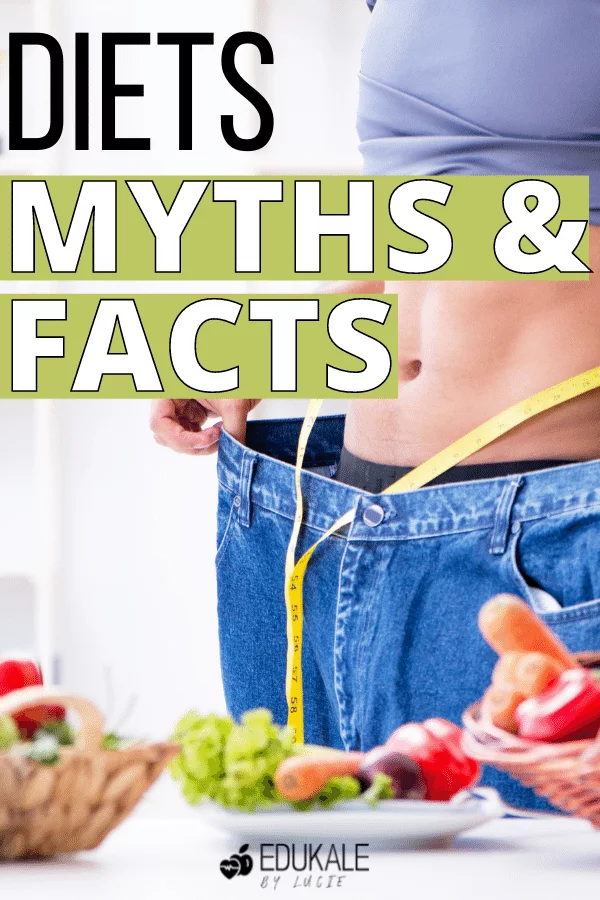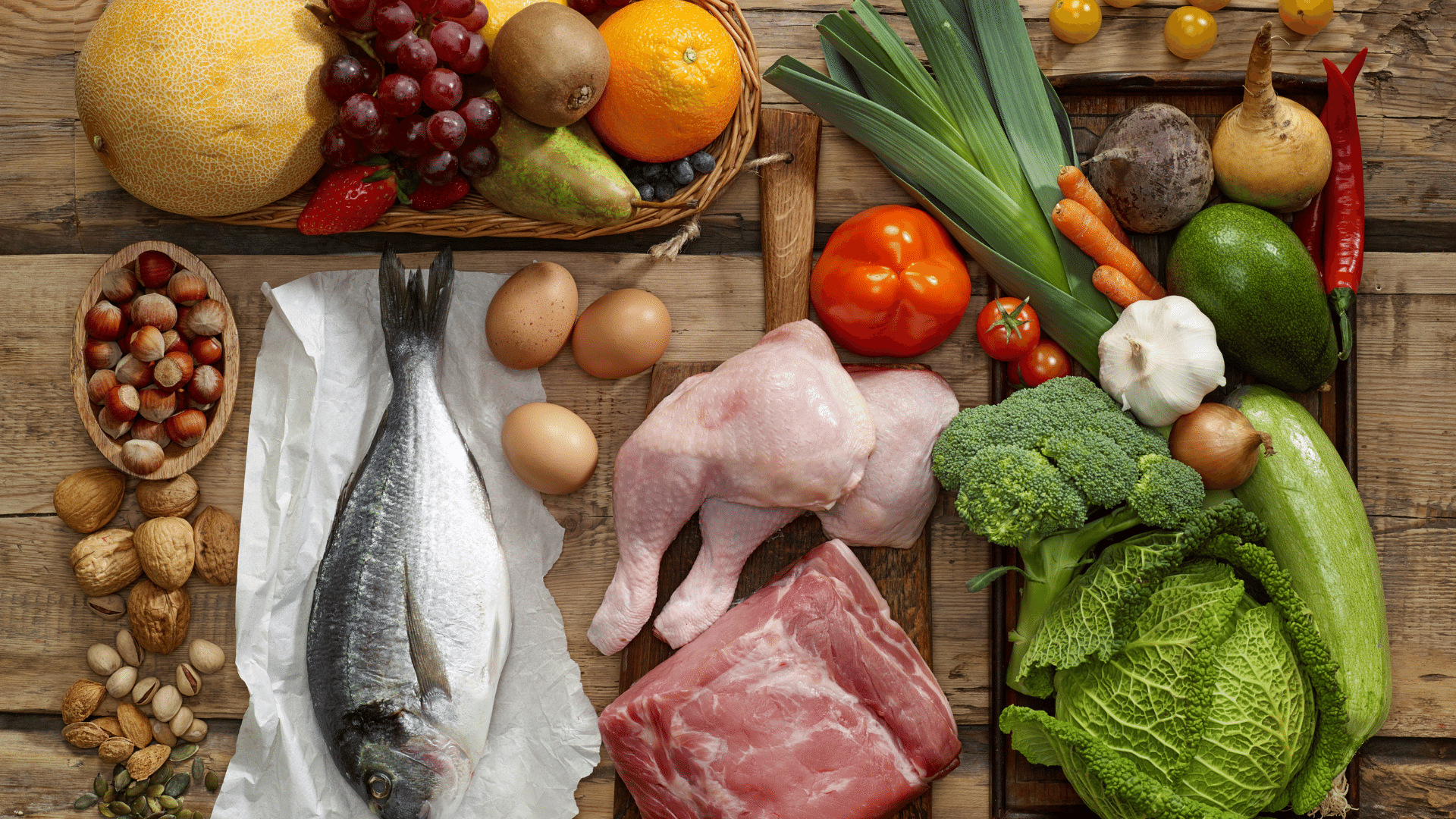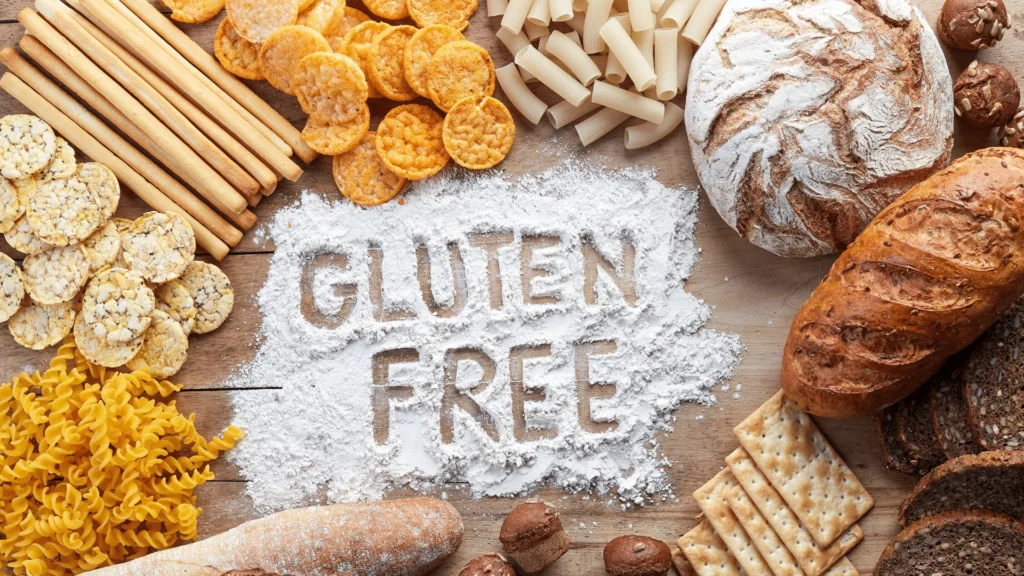This post contains affiliate links from which I may receive a small commission, at no extra cost to you. In no way does this affect my opinion or the information I provide on the product. Please read my disclaimer for more info.
Written by Lucie Villeneuve, nutritionist, M.Sc.
If you’ve been reading my blog for a while, you know that there isn’t a single diet that I really encourage. It’s all about learning some nutrition basics, building a great relationship with food, and figuring out what works for you.
Today, I’m sharing some myths and facts about popular diets to help you see things more clearly!

The Keto Diet
The keto diet is a high-fat, extremely low carbohydrate diet that pushes the body into a different metabolic state called ketosis. Your body will use ketone bodies as fuel rather than glucose.
The keto diet will make you lose weight: FACT
When you deprive your body of carbohydrates, its main source of easily accessible energy, it’s going to turn to your glycogen sources. Your glycogen stores are chains of glucose that hold molecules of water as well. When you start burning them off, you will lose a great deal of water, resulting in weight loss.
In addition, when you start off any diet, you’re more likely to be very diligent with everything and to do what it takes to lose the weight. After a couple of weeks, this will become harder and harder.
So yes, the keto diet will make you lose weight (like most diets, at first), but you will most likely gain it all back. Read more about the keto diet myth here!

The keto diet causes constipation: FACT
When you’re on the keto diet, there are a lot of sources of fiber you aren’t allowed to eat, like most fruit, a lot of vegetables, and whole grains. Fiber improves digestion, promotes bowel health, and prevents constipation, so limiting these food items can definitely lead to constipation and issues with your bowel movements. Read more about fiber here!
Intermittent fasting
Intermittent fasting is a practice that involves eating during specific periods of time only. In most cases, food options and calories aren’t restricted, but can only be consumed within a defined time frame (oftentimes an 8-hour eating window).
Intermittent fasting prevents aging: FACT
A lot of people say that they don’t practice intermittent fasting for weight reasons, but because it prevents aging.
Indeed, studies [1, 2] have shown that rats who were only fed every other day had an increased lifespan, and that intermittent fasting could improve survival rates in mature rats.
In addition, in our cells, certain waste products can accumulate and lead to neurodegeneration. Food restriction is known to induce this removal of these waste products, so fasting could be an easy way to do that [3].
However, while these studies are promising, it’s important to note that they were done on animals, and that they don’t necessarily reproduce the widespread intermittent fasting conditions.
Intermittent fasting isn’t a diet: MYTH
A lot of people think that, since they aren’t restricting any food groups or counting calories, intermittent fasting isn’t a diet. In reality, you’re still imposing certain things on your body, you’re still following food rules, and you’re still in a state of restriction.
Intermittent fasting can lead to the same downsides as other diets, like not meeting nutrient requirements, binge eating to compensate for restriction, and removing yourself from your intuitive way of eating, ultimately maintaining you in the diet culture mentality. Check out this article if you want to learn more about intermittent fasting!
The vegan diet
A vegan diet involves excluding any type of animal product like meat, fish, seafood, eggs, dairy, honey… Vegans also exclude animal products from their lifestyles like clothing items containing silk, wool, or leather, products that are tested on animals, zoos or circuses, etc.

A vegan diet is automatically healthy: MYTH
For a lot of people, veganism is the epitome of health, but in reality, you can be on a vegan diet, eat vegan junk food all the time, and be completely unhealthy. You can also be vegan, eat fruit all the time, and still be unhealthy if you aren’t meeting all of your macronutrient and calorie needs.
It’s still really easy to be healthy on a vegan diet as well, but some people are just on a vegan diet for ethical reasons and health isn’t their priority. Just like any way of eating, veganism requires planning and balancing and isn’t automatically healthy.
Fruit is healthy and should be consumed as much as you want: FACT
Fruit is extremely healthy and is filled with vitamins, minerals, fiber, water, and is so easy to eat. The only way you can eat too much fruit is if you’re overeating, and not listening to your hunger and fullness cues.
While I don’t recommend you start eating only fruit for breakfast lunch and dinner, I definitely think that the majority of people could benefit from eating more fruit. Fruit isn’t like cake or candy, you don’t have to restrict it, multiple studies show how beneficial fruit is for our health.
Eating fruit and vegetables is associated with a reduced rate of coronary heart disease [4], a reduced risk of type 2 diabetes [5], a reduction in strokes [6], a reduced risk of cancer [7], [8], and can improve your psychological well-being [9]. A few studies [10, 11] had people eat 20 servings of fruit a day for a few weeks or months and reported no adverse effects.
The Atkins diet
The Atkins diet is a high-protein, low-carb diet. The diet has different phases where different foods are able to be eaten or not. In the first phase, most fruit and veggies aren’t allowed.
Protein can’t make you gain weight: MYTH
There’s this general misconception that protein can’t make you gain weight for some reason, and that’s absolutely false. Just like any other macronutrient, if you overeat protein, it will be stored as fat and you will gain weight.
In addition, when you’re eating a lot of meat, like on the Atkins diet, you’re not eating pure protein— you’re also getting a lot of fat as well. While protein is undeniably very important, it isn’t the holy grail of macros, and too much of it can lead to weight gain. Read more about protein here!
Carbs are bad for you and will cause weight gain: MYTH
So many people try to avoid carbohydrates, but they should actually be your body’s main source of energy. They provide fuel for your cells in order for your brain and muscles to function.
You need to differentiate refined carbs, like cake, cookies, or processed sugary foods from whole carbs, like fruit, starchy veggies, or whole grains. While refined carbs shouldn’t be eaten for breakfast lunch and dinner, whole carbs definitely should.
As mentioned previously, fruit and veggies are extremely beneficial for your body, and whole grains are as well. Both are filled with fiber which is beneficial to your gut bacteria and has benefits like helping you feel fuller for longer, reducing cholesterol, improving glycemic control, protecting against heart disease, improving digestion and bowel health…
Check out my article on why carbs are healthy right here!
The Paleo diet
The paleo diet basically involves eating foods that your ancestors could eat, so foods that could be found while hunting and gathering. It includes meat, fish, fruit and vegetables, nuts…

It excludes more modern foods like processed foods or grains.
Processed foods are less healthy than whole foods: FACT
First of all, processing food can mean a lot of things. Simply cutting and freezing food is food processing. I like to use Dr. Greger’s definition of processed food, meaning nothing bad added, nothing good taken away.
So now if we look at real processed foods, I generally recommend that you lower their intake and increase the intake of whole foods, which are often healthier and more nutrient-dense. However, eating some processed foods is totally fine— they can bring you certain nutrients and are often more convenient.
Grains are inflammatory and should be avoided: MYTH
There are so many myths surrounding grains and the fact that they promote inflammation. This confusion may stem from the fact that, for a small group of people, like those suffering from celiac disease or gluten sensitivity, grains may be inflammatory.
However, this is not the case for the majority of people. In fact, studies show that whole grains actually lower inflammation and reduce body weight [12]. Whole-grain consumption is also associated with a lower mortality rate in both men and women. [13]
The Gluten-free diet
Being gluten-free means avoiding food products that contain gluten, which is found in wheat, barley, and rye. You can find gluten in foods such as bread, pasta, cereal, beer, baked goods made with flour (cake, cookies, pancakes…), and more.

Gluten-free foods are healthier: MYTH
Gluten is such a huge component of the Western diet that cutting it out without proper compensation may lead to certain deficiencies. Many gluten-containing foods like whole grains are filled with nutrients that are very important for good health, such as fiber, and we’ve already discussed why fiber is so beneficial.
Gluten-free foods also contain higher levels of lipids, trans fat, and salt than their gluten-containing counterparts. A study [14] that analyzed over 3000 food products found that gluten-free foods were not superior to those that did contain gluten.
They actually had lower protein and fiber content, and people on a gluten-free diet did not consume enough nutrient-dense foods to meet all of their nutritional recommendations.
Don’t hesitate to check out my article on gluten if you want more information!
Some people may benefit from avoiding gluten: FACT
While I definitely encourage most people to eat gluten, for people who suffer from celiac diseases or gluten sensitivity, gluten should absolutely be avoided. In their case, eating gluten can trigger an immune response and inflammation, which can damage their intestine’s lining over time [15].
Myths and facts about popular diets In short
You really don’t need to go on any type of fad diet to lose weight. The best thing you can do is to choose nutritious, whole foods, eat mindfully, care for your body and your mental health, exercise regularly, and build a healthy relationship with food.
-Lucie
If you’re interested in nutrition, its impact on our health, and the science behind it, you should definitely read How Not to Die. In this book, Doctor Michael Greger, founder of Nutrition Facts, examines the top causes of death in America and explains how your diet can prevent— and in some cases even reverse— them. His advice is all backed by science and he writes in a very clear and entertaining way. This book isn’t a list of what you already know. It will teach you the keys to living a long healthy life, in a simple and practical way, and without spending fortunes on supplements and pills!
PLUS if you want to take it a step further, you can check out the How Not to Die Cookbook to implement the advice easily!


